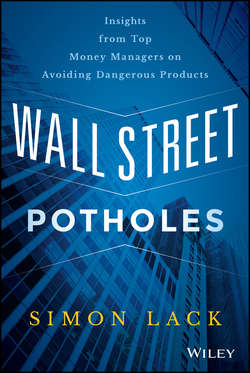Читать книгу Wall Street Potholes - Simon А. Lack - Страница 10
На сайте Литреса книга снята с продажи.
Chapter 1
Non-traded REITs: A Security That Shouldn't Exist
Where Are the Regulators?
ОглавлениеAt this stage, you might ask yourself, where are the regulators? If investors are being sold securities with ridiculously high fees and no liquidity, how come the government isn't doing something about it? There's certainly no shortage of laws and regulations that apply to finance. It is a highly regulated industry, and becoming more so every year. Fortunately, though, the Securities and Exchange Commission (SEC) is not responsible for offering a view on whether an investment is good or not. That's obviously as it should be. Reasonable people disagree all the time on the relative merits of one investment versus another. There's little benefit to the government having a view as well.
But the regulators can warn investors against certain types of investment. FINRA (the Financial Industry Regulatory Authority) has, to its credit, done this. Its website (FINRA 2012) offers warnings about the most adverse features of non-traded REITs, including the fees, lack of liquidity, and the fact that it operates as blind pools (you invest before any properties have been bought so you don't know what you'll own). The website notes that fees can be up to 15 % of your invested capital (15 % is the legal maximum – probably not coincidentally what Inland American set as its maximum).
FINRA's “Investor Alerts” section of its website includes warnings about several investments that should be approached with a high degree of skepticism, including certain types of annuity, structured notes, and some exchange-traded funds (ETFs). These and other pitfalls are all covered elsewhere in this book. I wasn't even aware of this website myself until I started looking for it – FINRA should find ways to publicize its existence, but it's not the kind of topic that's going to get TV producers lining up to book you on their business show. Nonetheless, at least the regulators are trying to do something to warn investors.
If a security is on FINRA's “Investor Alert” page, why would any self-respecting firm even get involved? Shouldn't that be enough to persuade firms that truly put the client first to stay away from such a security? I think that's part of the problem. Too few retail investors are aware of the warnings and potential problems. The brokerage firms involved like the fees and hardly ever find themselves in conversations explaining why they're selling something that, in effect, carries a government warning. It's why finance earns itself a poor reputation. Anybody who's bought a non-traded REIT and after regretting it subsequently found FINRA's website has every reason to be outraged at being offered the security in the first place. There's not enough good judgment being exercised. Maybe there ought to be a requirement that if you're recommending a security that is the subject of one of FINRA's Investor Alert pages, you have to provide a copy of the alert to the clients before they make a decision. Non-traded REITS' warning should be prominent, like that on cigarettes. The warning is already out there, just not well publicized. Doesn't the regulator want the retail investors they're charged with protecting to be aware of the dangers the regulator has identified? Isn't FINRA doing more than just expressing a research view?
I've chatted to some in the industry who disagree with me on non-traded REITs. One in particular thought my criticisms were unjustified and based on a poor understanding of the merits of the product. His argument relied on the fact that he'd had some very positive experiences for his clients with non-traded REITs, in that they'd made money. In other words, he'd found some that worked, so as long as you invested through someone like him possessing the insight to tell the wheat from the chaff, you'd be in good shape.
It's a common argument, and a weak one. First of all, just because some people have made money doesn't mean that on average they will. You can make the same case for casinos or the lottery. There are always some winners, but most gamblers understand that the odds are against them. These people gamble because the excitement of potentially winning overwhelms any understanding they may have of probability theory. Casino owners aren't poor, and publicly run lotteries augment tax revenues in many states. I avoid casinos and don't buy lottery tickets, but the people who do bet on lotteries save the rest of us from even higher taxes so they're performing a selfless public service.
Of course, using the fact of one good non-traded REIT as support for the overall investment sector isn't exactly careful research, any more than the bells ringing on a slot machine should persuade you to sit down with a bucket full of tokens. The correct question is, how have non-traded REITs done in aggregate? It turns out there's no reliable answer to this question. There's no non-traded REIT index. For the brokers who make fees selling them, such an index would probably hurt business. They certainly wouldn't want clients who knew enough to ask for the returns on such an index – the less sophisticated the better. And the existence of an index would also allow the performance on a specific non-traded REIT to be compared against its peers, revealing whether the profitable return was simply a result of a good market for similar securities rather than value-added security selection by the broker.
